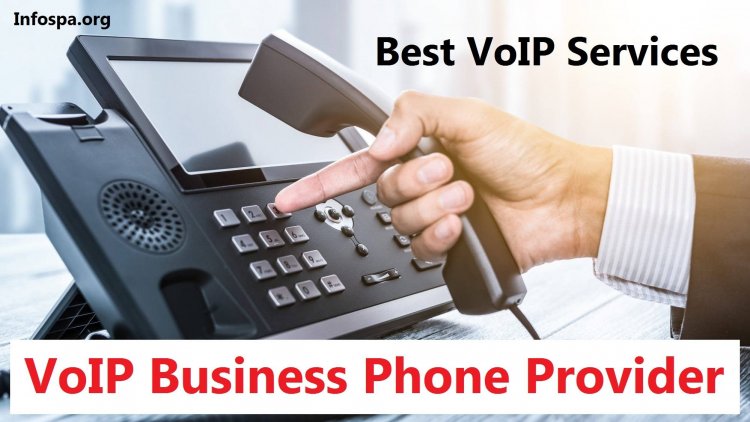Best VoIP Services: VoIP Business Phone Provider
VoIP Services:- To understand what is being said, the data is transformed from the original analog data, transmitted as digital data, and then converted back into an analog signal.

As technology advances and businesses adapt to ever-changing environments, many are abandoning traditional landlines in favor of voice-over-internet-protocol (VoIP) services. By integrating with other software, these cloud-based utilities can help reduce costs, improve remote collaboration, and boost efficiency.
There are hundreds of VoIP providers, each with its own set of features and pricing. Matching your company with the right service can be difficult, so Forbes Advisor examined the top options on the market and ranked the best VoIP services. Find the best option for your needs and budget today. VoIP Business Phone Provider
Also Read: VoIP Services For Small Business: 10 Best Business VoIP...
What Is VoIP?
A VoIP system is a communications system that makes phone calls and transfers data from one location to another using a computer, smartphone, VoIP phones, or WebRTC-enabled browsers. This is accomplished through the use of an internet connection. It differs from a traditional phone, also known as a landline, in the manner in which it transmits information and data.
A landline transmits analog signals over copper wires. VoIP, on the other hand, transmits data over a broadband internet connection. To understand what is being said, the data is transformed from the original analog data, transmitted as digital data, and then converted back into an analog signal.
Also Read: Best Accident Lawyers: Best Car Accident Lawyers...
VoIP systems are frequently complete office solutions that include voice mail, call recording, custom caller ID, and voice mail-to-text capabilities. Many offices use VoIP technology to create a unified communications system that allows teams to communicate with customers and among themselves. VoIP Business Phone Provider
SIP vs. VoIP
SIP and VoIP are two acronyms that you will come across when researching phone systems.
- SIP, or session initiation protocol, is a technology that enables many VoIP sessions. It is a fast open-source communication protocol between two points. It supports a variety of data transfers, such as voice, file sharing, instant messaging, video conferencing, and multimedia sessions.
- VoIP is technically only the voice component of the system's capabilities. It is the protocol that allows voice telephone calls to be made over an internet connection. It is not limited to a specialized VoIP phone; you can call from any computer or mobile device with an internet connection.
When all you need is phone call capabilities, VoIP technology can exist independently of more comprehensive SIP systems. A SIP system is required when additional data-sharing capabilities are required. However, the market frequently refers to more comprehensive solutions as VoIP solutions, leading to consumer confusion.
How To Choose the Best VoIP Provider

There are numerous VoIP service providers competing for your business. It can be difficult to determine which VoIP service is best for you. There are even some free VoIP providers from which you can obtain service. Here are some important characteristics to look for in the best business VoIP services: VoIP Business Phone Provider
Also Read: Car Insurance Comparison: Best Compare Car Insurance 2024
- Price. You want the solution to be less expensive than analog lines while still providing all of the bells and whistles you require to run your business successfully. Simultaneously, when comparing plans, consider what features are available at each tier level. Most basic plans, which are the most affordable, have the fewest features. You might have to pay a little more to get what you want.
- Quality and uptime of calls You don't want to sign a contract with a provider who frequently drops calls or has line jitter. Many service providers guarantee 99.99% uptime. This should give you confidence that their technology will withstand the daily abuse that you subject it to.
- Customer Support: While most VoIP providers provide support 24 hours a day, some only do so during business hours. Others charge an additional fee for phone support. Consider your company's requirements and choose the best option for you.
- Toll-Free Phone Numbers Not every business will require this feature, but if it is important to you, ensure that the providers you are considering provide it.
Popular VoIP Phone Service Features
The following are important VoIP phone features to consider when choosing a provider:
Automated attendant: Uses an automated system to transfer calls to the appropriate person, eliminating the need for a receptionist. This solution may include an interactive voice response (IVR) system.
Caller ID: This feature sets the tone for a call by informing you of who is on the other end of the line. This is especially important in the sales and service industries.
Call holding: Places a caller on hold so that you can finish another conversation or piece of business before addressing their needs.
Call queuing: Automatically places callers on hold and identifies a waitlist queue in the order in which the callers initially dialed. This is also known as automatic call distribution (ACD).
Music on hold: When compared to listening to dead airtime while on hold, music on hold helps to keep callers on hold for longer periods of time.
Custom ringback: This is what your inbound callers hear while waiting to speak with someone, similar to holding music. Typically, it is a message or a jingle.
Hot desking: Allows employees to access their messages and calls from any connected device.
Call flipping is also known as call pulling. While on the call, you can switch the call from one device to another.
Conferencing tools: Enables audio or video conferencing with employees or any other group you create.
Call monitoring allows managers to listen in on calls for training purposes. At the start of the call, a message that the "call is being monitored for quality assurance" is usually played.
Call whispering: This technology enables a manager to whisper into the ear of a phone representative in real time to help coach them through a call.
Call barging: Allows managers to take over a call if the phone representative is unable to adequately meet the needs of the customer.
Transcriptions: Written records of phone conversations that can be used for training or as evidence of call conversations.
Call recording allows managers to review not only the words said, but also the tone and inflection with which they were said.
Speed dial: A time-saving feature that allows employees to create frequently-called numbers with a single click or two.
Call forwarding: Allows calls to be forwarded to another device, allowing you to receive calls from locations other than the office.
Digital faxing: Does away with the need for an almost obsolete office machine. While most businesses rarely use faxes, this allows them to do so from a computer.
Integrations: Some VoIP systems can be integrated with third-party software, such as CRM platforms. This can assist you in streamlining key business functions while increasing the productivity of your sales and customer support teams.
Call analytics: Provides managers with critical information about call times and critical insights about calls.
Live chat: A modern alternative to leaving a message and waiting for a callback that many customers prefer.
Also Read Motorcycle Accident Lawyer. Need a Motorcycle Accident Attorney?
Benefits of VoIP
VoIP is a dependable system because it makes use of the more dependable fiber optic and broadband cables that transport internet data. Copper wires for landlines are less efficient than fiber optic cables, resulting in more dropped calls or line noise. VoIP Business Phone Provider
When you purchase a VoIP phone system, you will receive a plethora of features. As a reminder, many of these advantages are the result of SIP technology, but they are included as part of your VoIP system. VoIP systems are usually less expensive than getting landlines for the same number of phone numbers for everything they do. VoIP Business Phone Provider
Drawbacks of VoIP
There are numerous benefits to using VoIP, but there are some drawbacks to consider before making the switch. One of the main disadvantages is that the phone system, and thus the quality of calls, is entirely dependent on the quality of the internet connection—the better the connection, the better the calls. However, if your internet connection fails for any reason, at any time, your phone will also fail. Lower-speed internet connections can also cause dropped calls and jitter on the line.
Another disadvantage of VoIP is that the connection is not always secure. This means that the calls can be easily breached with others listening in. It is critical to ask the company you are contracting with for VoIP services whether they use high-level encryption to protect you and your company's data. VoIP Business Phone Provider
The use of the VoIP system in emergencies is a final disadvantage. Numbers are not always local as businesses strive to establish a presence in specific areas of the country while callers are located elsewhere. In an emergency, responders use the phone number to locate the caller and provide assistance. Responders may take longer to reach you if you do not have an E911 emergency address linked to your VoIP line.
Also Read: LIC IPO and Fed meeting are two of six things that could...
How Does VoIP Work?
VoIP requires an internet connection to function. To transfer the data, you'll need specific hardware. A personal computer and a cable modem are included in the hardware. If you are calling from a phone, you will need a phone adapter or a VoIP-ready phone. The adapter converts analog signals into digital signals that can be sent over the internet. The data is converted back to an analog signal during the call so that the other party can understand what is being said. VoIP Business Phone Provider
When using VoIP on a mobile phone, you can connect to the internet wirelessly to send data. Data is stored in the cloud and can be accessed through a dashboard on a computer or mobile device. Contacts and business phone numbers are examples of data.
Types of VoIP Services
Most business owners believe that all VoIP systems are the same. There are some variations in the types of VoIP services available.
Hosted VoIP
A hosted VoIP service differs from an on-premises VoIP solution. When things are on-premises, everything from the equipment to the connection is installed and maintained by the company deploying the system. When a VoIP system is hosted, it is maintained by the system's provider. The company installing the phone system really only needs to supply the phones and an internet connection. All other high-priced hardware is covered by the provider. VoIP Business Phone Provider
Cloud-Based VoIP
Cloud-based VoIP phone systems make calls over the internet and store everything on the provider's server network. When a company opts for this type of phone system, they avoid having to manage hardware; instead, they simply plug the phones in and dial. VoIP Business Phone Provider
UCaaS
Unified communications as a service (UCaaS) is a cloud-based communications technology that is based on six critical communications functions. The six communication functions are as follows:
- Telephone capacity
- Audio, video and web conferencing
- Unified messaging
- Instant messaging
- Mobility
- Business processes enabled by communications
UCaaS extends beyond VoIP solutions to include SIP solutions as well. Systems can be tailored to meet specific business requirements. The best UCaaS providers assist businesses in streamlining their daily operations and improving their processes.
Also Read Nifty50: Dalal Avenue Week Ahead: Nifty50 in a no-trade...
CPaaS
Cloud-based, customized communications services for unified communications systems are provided by the communications platform as a service (CPaaS). It is fully adaptable to any business and it's needs because it is fully customizable. Everything on the platform is integrated to work in real time and does not require access to external systems. VoIP Business Phone Provider

Setting Up Your VoIP System
Choosing the right VoIP system is the first step in getting the VoIP system up and running. Select a provider that provides hardware support, such as phones, for your office. It is also beneficial to select a provider that provides E911 calls, which provide emergency responders with callback numbers and callers' locations.
Determine how many lines you will require. When choosing a provider, consider requirements such as porting an existing number to your new system. Maintaining consistency in numbers is critical if your company has been around for a while. Make sure to inform the provider of this when you sign up for the service. VoIP Business Phone Provider
After you've chosen a provider and given them permission to do the initial setup on their end, the next step is to connect the system. Connecting the communications device (phone or computer) to the internet is what this entails. Your service provider will walk you through the configuration steps to ensure that your calls are properly transferred across the network. Check the system to see if any problems need to be resolved.
Common VoIP Add-Ons
Because VoIP is a comprehensive solution that most providers provide, you can request add-ons to customize your business and meet its specific needs. VoIP Business Phone Provider
Virtual and Vanity Phone Numbers
When requesting a phone number, you have the option of requesting a virtual phone number or a vanity phone number. A virtual phone number allows you to have a number from a geographic region in which you do not live, allowing you to better serve customers from all over the world. A vanity phone number is easy to remember because it combines letters and numbers, frequently representing a portion of the company's name or slogan.
Video Conferencing
Businesses can use video conferencing to hold internal meetings or to meet with customers virtually. This is part of the new business model, especially post-pandemic, and is something that most companies will want as an add-on to their business model. VoIP combines the best video conferencing software with call capabilities. VoIP Business Phone Provider
Conference Calling
Hosting conference calls is an essential part of hosting a virtual meeting or seminar. Top VoIP providers use cutting-edge conference call technology to provide a seamless experience.
CRM
The majority of businesses want their phone system to work in tandem with their customer relationship management (CRM) software. This means that your phone representatives can access important client information and purchases while on the phone. It's a quick way to get data from your employees. The best CRM systems are used by top VoIP providers. Note:- This information is Taken From Forbes.com, VoIP Business Phone Provider

























